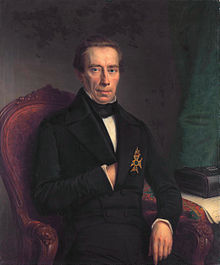
Back يوهان رودولف ثوربيك ARZ Ёхан Рудальф Торбеке Byelorussian Ёган Рудольф Торбэке BE-X-OLD Johan Thorbecke Catalan Johan Rudolph Thorbecke Czech Johan Rudolf Thorbecke German Johan Thorbecke Esperanto Johan Rudolf Thorbecke Spanish Johan Rudolph Thorbecke Basque یوهان رودلف توربکه Persian
You can help expand this article with text translated from the corresponding article in Dutch. (April 2020) Click [show] for important translation instructions.
|
Johan Rudolph Thorbecke | |
|---|---|
 Portrait by Johan Heinrich Neuman, 1852 | |
| Prime Minister of the Netherlands | |
| In office 4 January 1871 – 4 June 1872 | |
| Monarch | William III |
| Preceded by | Pieter Philip van Bosse |
| Succeeded by | Gerrit de Vries |
| In office 1 February 1862 – 10 February 1866 | |
| Monarch | William III |
| Preceded by | Schelto van Heemstra |
| Succeeded by | Isaäc Dignus Fransen van de Putte |
| In office 1 November 1849 – 19 April 1853 | |
| Monarch | William III |
| Preceded by | Jacob de Kempenaer |
| Succeeded by | Floris Adriaan van Hall |
| Minister of the Interior | |
| In office 4 January 1871 – 4 June 1872 | |
| Preceded by | Cornelis Fock |
| Succeeded by | Pieter Philip van Bosse |
| In office 1 February 1862 – 10 February 1866 | |
| Preceded by | Schelto van Heemstra |
| Succeeded by | Johan Herman Geertsema Carelszoon |
| In office 1 November 1849 – 19 April 1853 | |
| Preceded by | Jacob de Kempenaer |
| Succeeded by | Gerlach Cornelis Joannes van Reenen |
| Member of the House of Representatives | |
| In office 25 February 1868 – 4 January 1871 | |
| In office 19 November 1866 – 3 January 1868 | |
| In office 14 March 1866 – 1 October 1866 | |
| In office 27 June 1853 – 31 January 1862 | |
| In office 17 October 1848 – 31 October 1849 | |
| In office 21 May 1844 – 19 October 1845 | |
| Personal details | |
| Born | Johan Rudolph Thorbecke 14 January 1798 Zwolle, Batavian Republic |
| Died | 4 June 1872 (aged 74) The Hague, Netherlands |
| Nationality | Dutch |
| Spouse |
Adelheid Solger
(m. 1836; died 1870) |
| Children | 6 |
| Alma mater | Leiden University |
| Occupation |
|
| Signature | |
Johan Rudolph Thorbecke (14 January 1798 – 4 June 1872) was a Dutch liberal statesman, one of the most important Dutch politicians of the 19th century. Thorbecke is best known for heading the commission that drafted the revision of the Constitution of the Netherlands in 1848, amidst the liberal democratic revolutions of 1848. The new constitution transformed the country from an absolute monarchy into a constitutional monarchy, with the States General and the Council of Ministers becoming more powerful than the king. The amended constitution also granted individual rights to residents and citizens of the kingdom. This made the constitution one of the more progressive at the time. Thorbecke is generally considered a founding father of the modern political system of the Netherlands.